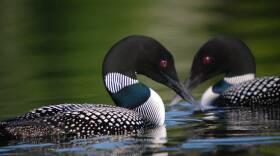Humans tend to sense and respond to winter - the cold, the snow, the wind, the short days - by controlling their environment. We mediate winter's effect by living in a warm house, wearing thick jackets or flying like "snowbirds" south to warm and sunny climates.
Plants and animals also sense and respond to winter. In some ways, their responses are remarkably similar to our own. Mountain goats and wolves gain thicker coats. Migratory birds fly south. However, rather than "controlling" their environment, plants and animals have adapted to their environment. Winter is a time when the natural world must conserve energy to ensure survival.
There are more examples of winter adaptations: Moose lower their body temperatures during the winter, thereby reducing their basal metabolism and reducing food requirements. Badgers and wolverines can go into torpor (short periods of dormancy), whereas bears, ground squirrels and marmots hibernate. Reptiles and amphibians have adopted a "passive" strategy in winter, preferring to hang out at the bottom of ponds or beneath rocks. Small birds and mammals have variable body temperature (known as heterothermy) and may even huddle to stay warm. Even bees swarm to stay warm.
Some plants and insects avoid winter altogether by dying; that is, they produce seeds or eggs that overwinter while the adult dies. Deciduous trees shed their leaves to conserve energy, while conifers "harden," which is a physiological acclimation to increasingly cold temperatures. Spruce trees, and conifers in general, have also adapted to winter by evolving branches which slope out and downward, allowing snow to fall off.
Humans sense and respond to winter very differently. While some of us hibernate, others adopt high tech winter gear and careen off mountain slopes for the sheer joy of it! Whatever your sense and response to winter, you may find that winter demands more energy, planning and thoughtfulness. Like the natural world we must also conserve precious energy. We must adapt not only to winter's demands, but winter's unpredictability, like warm winters and false springs.
Even if you're a hibernator, learn to adapt and don't miss out of winter's beauty or time for rejuvenation. Praise winter! Seek out dripping icicles, crystalline silence and softly lit landscapes. Gather snowflakes. Listen for the call of the wild in the chill wind. Huddle and swarm. And in the evening's alpenglow bless the seeds of life waiting in the darkness for the call of the spring.
"Field Notes" is produced by the Montana Natural History Center.
(Broadcast: "Field Notes," 1/31/16. Listen on air or online Sundays at 12:55 p.m., Tuesdays at 4:54 p.m., and Fridays at 4:54 p.m., or via podcast.)









